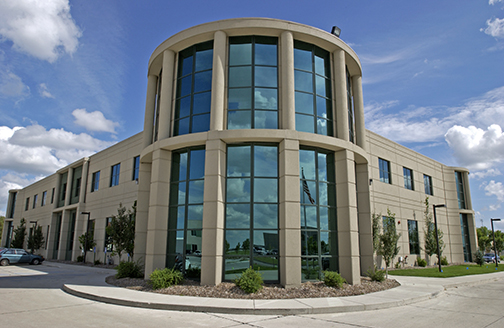Coatings & Polymeric Materials
The Department of Coatings and Polymeric Materials graduate program is open to all qualified graduates of universities and colleges of recognized standing. To be admitted with full standing status to the program, the applicant must meet the Graduate School admission requirements and have adequate preparation in a science or engineering field.
Financial Assistance
The student must first be accepted in full or conditional status to be eligible for an assistantship in the Department of Coatings and Polymeric Materials. To be considered for an assistantship, the Graduate School application packet must be complete no later than April 15. International students must also submit a TOEFL or IELTS score. General and subject GRE scores are highly encouraged if they are available to the student. Graduate students may be supported during both the academic year and summer months by either teaching or research assistantships.
The current monthly stipend is $1,750+ per month, for an annual stipend of $21,000+. In addition to the stipend, graduate assistants receive a graduate tuition waiver. Tuition waivers cover base tuition for NDSU graduate credits only. Students are responsible for differential tuition, student fees, and tuition for non-graduate level credits taken or Cooperative Education credits.
The Master of Science program requires the completion of 16 credits of letter-graded course work with an overall GPA of 3.0 or better. The Ph.D. program requires the completion of 27 credits of letter-graded course work with an overall GPA of 3.0 or better. Each student must choose a thesis (research) adviser within three to six months of beginning graduate school. After two semesters, the student must also select a supervisory committee. This committee advises the student and administers oral examinations. Candidates for the M.S. program normally satisfy course requirements within one year of study. Ph.D. candidates typically take about two years to complete courses, leaving later years for full-time dissertation research.
Candidacy qualifying examinations are administered twice annually. All Ph.D. candidates are required to pass the qualifying exam and defend an original written research proposal at least eight months prior to the final dissertation examination. The proposal topic must be approved by the student's research adviser, and the supervisory committee administers the oral exam. Lastly, following completion of dissertation research and the presentation of an acceptable written dissertation, the candidate defends it before the supervisory committee.
Accelerated M.S. Program
An accelerated M.S. degree program is available for students enrolled in a major at NDSU and the Coatings and Polymeric Materials minor program. This program will allow qualified students to complete a B.S. plus M.S. degree in as little as five years. Students should declare their intent to enroll in the accelerated M.S. program during their sophomore year. Contact the department for more information on the requirements for the program.
Eugene B. Caldona, Ph.D.
University of the Philippines Diliman, 2015
Mississippi State University, 2020
Research Interests: Corrosion-Preventing Materials, Electrochemistry and Surface Chemistry, Additively Manufactured Polymeric Materials, Polymer Nanocomposites, Fluoropolymers, Elastomer-Enhanced Thermosets, Thin Films, Biobased Materials, and Stimuli-Responsive and Super Liquid-Repellent Coatings
Erik Hobbie, Ph.D.
University of Minnesota, 1990
Research Interests: Nanotechnology, Nanoparticles Polymers, Optics and Rheology
Mohiuddin Quadir, Ph.D.
Freie University Berlin, 2010
Research Interest: Organic Polymer Chemistry, Functional self-assembly of polymers, Biomaterials, Application-guided modification of polymers for pharmaceutical and medical use, Bio-based materials
Xiaoning Qi, Ph.D.
North Dakota State University, 2009
Research Interests: Corrosion Characterization and Prevention, Coating Design and Formulation, Sustainable Coating Solutions, Bridge Coatings, High Temperature Coatings, Durable Functional Surfaces, and Repairable/Healable Coatings.
Bakhtiyor Rasulev, Ph.D.
Uzbek Academy of Science, 2002
Research Interests: Cheminformatics, Computational Chemistry of Polymers and Coating Materials, Quantitative Structure-Activity Relationship, Predictive Models Development, Molecular Modeling, Nanoparticles, Physico-Chemical Properties and Toxicity Assessment
Andriy Voronov, Ph.D.
Lviv Polytechnic National University, 1994
Research Interests: Polymer Synthesis, Micellar Self-Assembly, Sustainable Biobased Polymeric Materials, Responsive Polymers for Biomedical Applications, Polymers for Biomimetic Conversion of Biomass, Polymer Latexes, Polymer Hydrogels, Polymer Thin Films.
Dean Webster, Ph.D.
Virginia Polytechnic Institute and State University, 1984
Research Interests: Polymer Synthesis, Thermosets, Polymerization Reactions, Bio-based materials, Marine Coatings, Combinatorial and High Throughput Methods.
Adjunct Faculty
Dante Battocchi, Ph.D.
University of Trento, 2001
North Dakota State University, 2012
Research Interests: Electrochemical Noise Measurements, Scanning Vibrating Electrode Technique (Svet), Organic Metal-Rich Primers Characterization and Development, Materials Protection and Metal Corrosion
Bret Chisholm, (Bridgestone-Firestone)
University of Southern Mississippi, 1993
Research Interests: Electrochemical Noise Measurements, Scanning Vibrating Electrode Technique (Svet), Organic Metal-Rich Primers Characterization and Development, Materials Protection and Metal Corrosion
Victoria Gelling, Ph.D. (Sherwin-Williams)
North Dakota State University, 2002
Research Interests: Electrochemistry, Corrosion, Environmentally Compliant Corrosion Inhibitors
Ghasideh Pourhashem, Ph.D.
Drexel University, 2014
Research Interests: Environmental impact assessment to inform decision making, Life cycle assessment (LCA) and techno-economic analysis (TEA) of bio-based products, Industrial Ecology, bio-based product policy
Brian S. Skerry, Ph.D.
University of Manchester, 1980
Research Interests: Corrosion and Coatings
Emeritus Faculty
Stuart G. Croll, Ph.D.
University of Leeds, 1974
Research Interests: Weathering Durability of Coatings, Service Lifetime Prediction, Colloidal Stability, Molecular Modeling, Pigment-Polymer Interactions, Film Formation Processes, Coating Physics, Art Conservation
Dennis E. Tallman (formerly of NDSU Dept. of Chemistry)
The Ohio State University, 1968
Research Interests: Analytical And Physical Electrochemistry, Corrosion Mechanisms, Corrosion Control By Coatings, Electroactive Conducting Polymers, Scanning Probe Techniques Microelectrodes And Microelectrode Arrays

